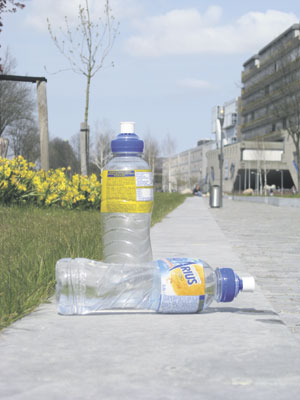Many things are designed for everyday use. Some you fall in love with, others drive you up the wall.
What in the world is there to design about water? Drinking water is nothing more than H20 with a few salts and minerals mixed in.
But we need plenty of water to stay alive. So much, actually, that it has become popular to carry around bottles of the good stuff and even bring them to class.
In a classroom with some 400 students, I recently counted upwards of 40 bottles of water. As this happened to be a class on hydrology, I asked the class what they thought a liter of tap water costs. We were using one of those new systems, where students enter their answers with clickers, and after a few seconds a histogram with the answers popped up on the screen.
It turned out that the majority of first-year students thought the price of tap water was significantly higher than the actual price, which is in fact less than 1.50 euros per cubic meter. Most, if not all, of the students who had brought a bottle of water to class had paid significantly more money by buying bottled water in a store.
There are three major reasons why buying bottled water is a bad idea. First, bottled water is a lot more expensive. The price of a 0.33L bottle of water is somewhere around one euro (a bit more expensive at train or gas stations, and less so at your local supermarket). For the same euro you can refill your empty bottle 2,000 times from the tap. That is, a refill a day for more than five years! If this isn’t convincing enough that bottled water is a bad idea, let’s go to reason two.
The second reason is that bottled water is no better than tap water. Although this may not be true in all countries, it certainly is here. In Holland we can be very proud that we don’t put chlorine in our tap water (we use ozone instead), so our tap water tastes excellent and doesn’t have the chlorine taste that you find in many places abroad. There is no good reason not to drink Dutch tap water unless you absolutely need bubbles. And if that’s the case, you may as well buy a fermented beverage made with grains and hops and really enjoy yourself!
The third and probably most important reason why buying bottled water is a bad idea is that every time you buy water, you also buy a plastic bottle. And what happens with the plastic bottle when you’re finished? Sure, sure, you always recycle, but most people throw it in the trash. Accurate statistics on the number of single-use water bottles used daily are difficult to find, but numbers vary from ten bottles per person per year in Holland to 100 bottles per person per year in the USA. Either way, that’s an immense amount of bottles. Using the Dutch statistic, we arrive at half a million plastic bottles daily in Holland alone. And these bottles, which are often simply filled with tap water, need to be transported on trucks to your local store. What a waste for getting pretty much the same water!
There is of course a simple solution: buy one bottle and reuse it. You can buy a six-pack at the supermarket and keep refilling your bottles over and over. Or you can buy a special bottle for carrying around water. The project Neau sells empty water bottles (eau means water in French, and ‘neau’ is pronounced as ‘no’), which have the Neau label on the bottle. Neau’s proceeds go towards clean drinking water projects in developing countries. Alternatively, you can wait till this summer, when you can buy the Dopper bottle, which has a cool design and is easy to clean. And especially for geeks like us, Dopper has an iPhone app that guides you to the closest point where you can get free tap water to fill your bottle when you’re not at home.
Mark Bakker is an associate professor at the faculty of Civil Engineering & Geosciences
Ook loopt de schuld per student op. De gemiddelde studieschuld van degenen die vanaf dit jaar terugbetalen is 12.523 euro. Dat is vierhonderd euro meer dan de groep die een jaar eerder ging aflossen. Een jaar eerder was de stijging overigens 1200 euro. Hoe pakken TU-studenten dit aan?



Comments are closed.